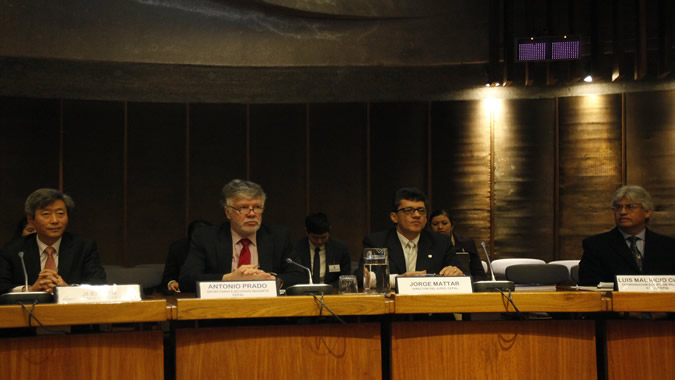News
(25 September 2014) Foresight provides the long-term vision that is key to creating public policies, several speakers emphasized during the inauguration of the Seminar Latin America and the Caribbean 2030: World visions, continental views, which is being held at the headquarters of the Economic Commission for Latin America and the Caribbean (ECLAC), in Santiago, Chile.
At the opening ceremony, on Wednesday 24 September, ECLAC's Deputy Executive Secretary, Antonio Prado, said that the current situation is particularly favorable for boosting the practice of foresight, given that the regional scenario for moderate growth in the medium term along with the global debate on the post-2015 agenda are forcing thinkers to explore alternatives to the development model of the last two decades.
In that debate, the United Nations organization advocates a structural change that puts equality at the center of development goals. Jorge Máttar, director of ECLAC's Latin American and Caribbean Institute for Economic and Social Planning (ILPES), explained that this proposal requires a long-term vision. He said that foresight allows for an analysis of the most suitable paths for these needed transformations and thereby contributes to improving the design and application of public policies.
The seminar, which will conclude today, is organized by ILPES and supported by the Korean government. The Ambassador of that country in Chile, Ji-eun Yu, recalled that since its incorporation as a member state of ECLAC in 2007, the Republic of Korea has worked together with this organization to encourage the region's economic and social development. He pointed to this gathering as a good example of that cooperation.
The meeting aims to consolidate a network of professionals and organizations dedicated to studying future global trends and their implications for public policy in the region.
Ten experts are participating in the plenary sessions, among them William Halal, Professor Emeritus of Management, Technology and Innovation at George Washington University; Moonjung Choi, Director General of the Office of Strategic Foresight at Korea Institute of S&T Evaluation and Planning (KISTEP); Barry B. Hughes, Director of the Frederick S. Pardee Center for International Futures at the University of Denver; and Catarina Tully, Director of the School for International Futures, United Kingdom.
The presentations will address issues related to climate change, sustainable cities, emerging technologies and economic cooperation with China, among others.
The audience is composed of planning authorities from throughout the region, who will give their opinion on the specialists' proposals. These officials include Gabriel Frugoni, Director of Uruguay's Planning and Budget Office; Hugo Gómez Cabrera, Guatemala's Deputy Secretary of Planning; and Santiago Vásquez, Ecuador's National Deputy Secretary of Planning and Development.
Moreover, the Chilean Council of Planning and Strategy was presented on Wednesday 24. It brings together a group of politicians, academics and diplomats interested in contributing to the development of foresight in Chile. This presentation was led by Sergio Bitar, a member of the Foreign Strategy Committee at Chile's Ministry of Foreign Affairs.
During the event, the II Development Planning Sessions will also be held. Around 20 papers on planning and foresight in the region are expected to be presented in parallel sessions.



